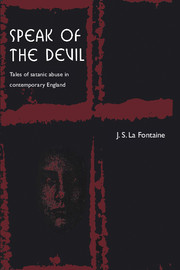Book contents
- Frontmatter
- Contents
- List of tables
- Acknowledgements
- 1 Introduction: the problem
- 2 The personification of evil
- 3 Witches, satanists and the occult
- 4 The extent of the allegations
- 5 The question of proof
- 6 Explaining belief
- 7 Children's stories
- 8 Confessions and tales of horror
- 9 A modern movement of witch-finders?
- 10 Aftermath and conclusions
- Notes
- Bibliography
- Index
8 - Confessions and tales of horror
Published online by Cambridge University Press: 05 June 2012
- Frontmatter
- Contents
- List of tables
- Acknowledgements
- 1 Introduction: the problem
- 2 The personification of evil
- 3 Witches, satanists and the occult
- 4 The extent of the allegations
- 5 The question of proof
- 6 Explaining belief
- 7 Children's stories
- 8 Confessions and tales of horror
- 9 A modern movement of witch-finders?
- 10 Aftermath and conclusions
- Notes
- Bibliography
- Index
Summary
Confessions have received little attention in anthropological studies of witchcraft (Douglas 1970: xxxiv), but, in the little that we know about epidemic witch-hunting in Africa, it is reported that during the cleansing rituals or the magic seeking-out of witches, men and women of the village concerned might confess to having performed witchcraft (Willis 1970: 130). Historians have had to concern themselves more with confessions, since they formed a major part of the evidence in the witch trials. It was a puzzling feature of the early modern witch-hunts that some of the accused confessed quite freely to being witches, although by doing so they might well have been signing their own death warrants. Levack argues that a small minority of the accused witches probably did practise magic, for the existence of which there was independent evidence, but confessions were the only evidence for the existence of the collective worship of the devil and such confessions almost never arose until torture was applied (Levack 1987: 11–13.) An analysis of confessions in seventeenth-century Germany by Lyndal Roper shows them to have been a mixture of private feelings, folk beliefs and the effects of torture; the narratives describing the activities of witches and their worship of the devil were built up in a series of interchanges between investigator and accused (Roper 1994: 204–6).
Despite the existence of spontaneous confessions of pacts with the devil and even of devil worship during the period of the witch-hunts, there has been no evidence that such acts ever took place.
- Type
- Chapter
- Information
- Speak of the DevilTales of Satanic Abuse in Contemporary England, pp. 134 - 155Publisher: Cambridge University PressPrint publication year: 1998



